人教版高中英语选修六虚拟语气
- 格式:ppt
- 大小:1.90 MB
- 文档页数:35
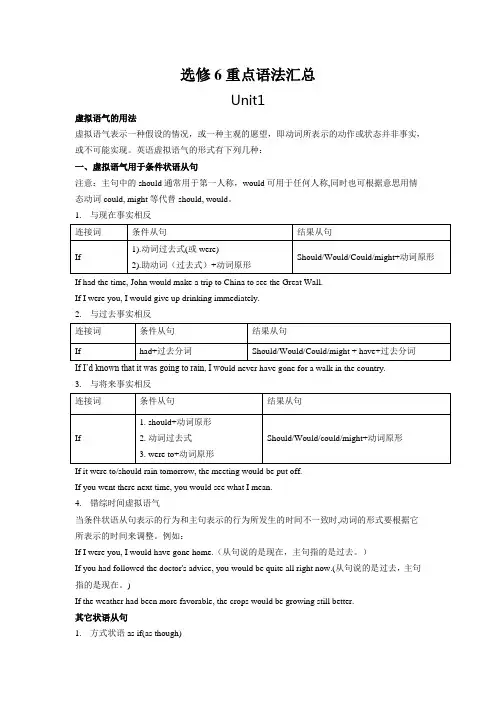
选修6重点语法汇总Unit1虚拟语气的用法虚拟语气表示一种假设的情况,或一种主观的愿望,即动词所表示的动作或状态并非事实,或不可能实现。
英语虚拟语气的形式有下列几种:一、虚拟语气用于条件状语从句注意:主句中的should通常用于第一人称,would可用于任何人称,同时也可根据意思用情态动词could, might等代替should, would。
1.与现在事实相反If had the time, John would make a trip to China to see the Great Wall.If I were you, I would give up drinking immediately.2.与过去事实相反If I’d known that it was going to rain, I wo uld never have gone for a walk in the country.3.与将来事实相反If it were to/should rain tomorrow, the meeting would be put off.If you went there next time, you would see what I mean.4.错综时间虚拟语气当条件状语从句表示的行为和主句表示的行为所发生的时间不一致时,动词的形式要根据它所表示的时间来调整。
例如:If I were you, I would have gone home.(从句说的是现在,主句指的是过去。
)If you had followed the doctor's advice, you would be quite all right now.(从句说的是过去,主句指的是现在。
)If the weather had been more favorable, the crops would be growing still better.其它状语从句1.方式状语as if(as though)如果从句表示与现在事实相反,谓语动词用一般过去时;表示与过去事实相反,谓语动词用"had+过去分词";表示与将来事实相反;谓语动词用"would(might, could)+动词原形"。
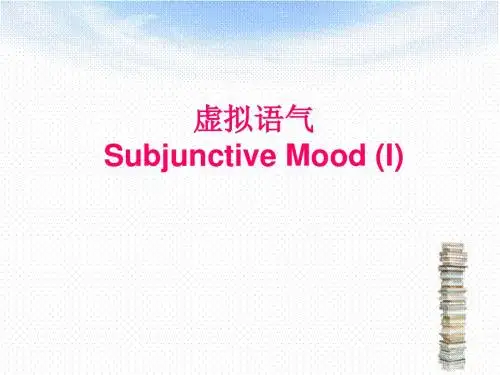
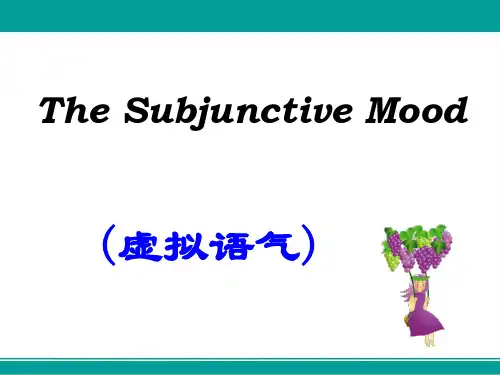
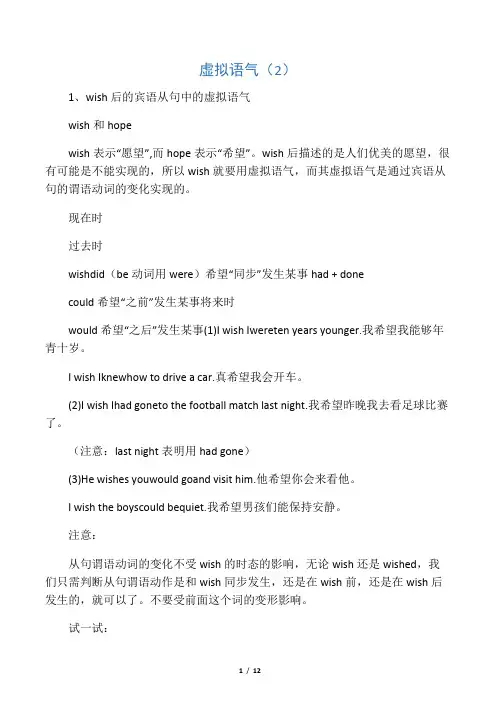
虚拟语气(2)1、wish后的宾语从句中的虚拟语气wish和hopewish表示“愿望”,而hope表示“希望”。
wish后描述的是人们优美的愿望,很有可能是不能实现的,所以wish就要用虚拟语气,而其虚拟语气是通过宾语从句的谓语动词的变化实现的。
现在时过去时wishdid(be动词用were)希望“同步”发生某事had + donecould希望“之前”发生某事将来时would希望“之后”发生某事(1)I wish Iwereten years younger.我希望我能够年青十岁。
I wish Iknewhow to drive a car.真希望我会开车。
(2)I wish Ihad goneto the football match last night.我希望昨晚我去看足球比赛了。
(注意:last night表明用had gone)(3)He wishes youwould goand visit him.他希望你会来看他。
I wish the boyscould bequiet.我希望男孩们能保持安静。
注意:从句谓语动词的变化不受wish的时态的影响,无论wish还是wished,我们只需判断从句谓语动作是和wish同步发生,还是在wish前,还是在wish后发生的,就可以了。
不要受前面这个词的变形影响。
试一试:1) I wish I ________a bird. (be)2) I wish/wished I ________ (not eat) so much watermelon.3) The party was terrible, I wish I ________ (never go) to it.4) I wish it ________ (rain) tomorrow.答案与解析:1) were。
现在的愿望,即与wish同步的愿望,用were。
不用was。
2)hadn’t eaten。
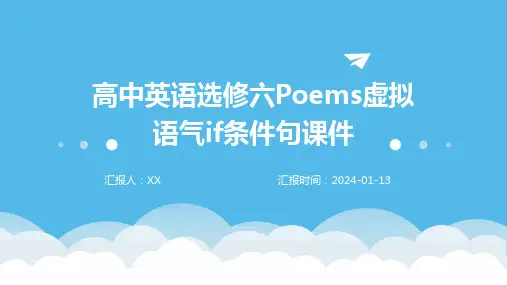
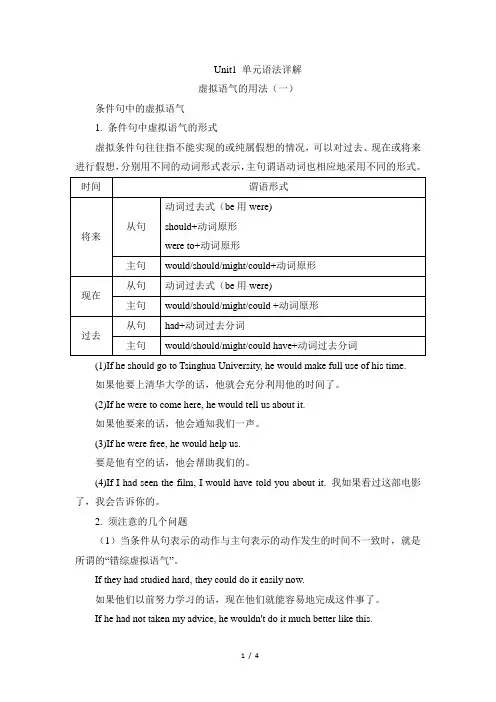
Unit1 单元语法详解虚拟语气的用法(一)条件句中的虚拟语气1. 条件句中虚拟语气的形式虚拟条件句往往指不能实现的或纯属假想的情况,可以对过去、现在或将来进行假想,分别用不同的动词形式表示,主句谓语动词也相应地采用不同的形式。
(1)If he should go to Tsinghua University, he would make full use of his time.如果他要上清华大学的话,他就会充分利用他的时间了。
(2)If he were to come here, he would tell us about it.如果他要来的话,他会通知我们一声。
(3)If he were free, he would help us.要是他有空的话,他会帮助我们的。
(4)If I had seen the film, I would have told you about it. 我如果看过这部电影了,我会告诉你的。
2. 须注意的几个问题(1)当条件从句表示的动作与主句表示的动作发生的时间不一致时,就是所谓的“错综虚拟语气”。
If they had studied hard, they could do it easily now.如果他们以前努力学习的话,现在他们就能容易地完成这件事了。
If he had not taken my advice, he wouldn't do it much better like this.如果他过去不听我的建议,他就不会像这样做得好多了。
If they had informed us, we would not come here now. 如果他们通知过我们的话,我们现在就不会来这里了。
If he knew her,he would have greeted her. 要是他认识她的话,他肯定会去问候她。
(2)当虚拟条件句中有were,should,had时,if可省略,而将were,should,had提到主语前面。
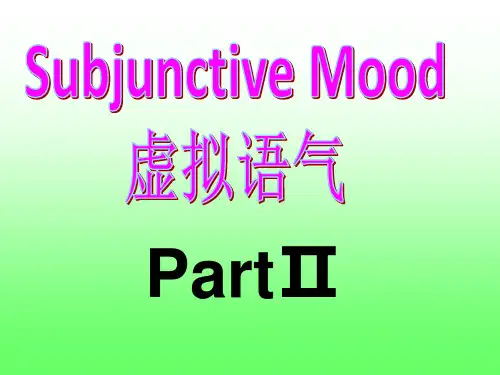
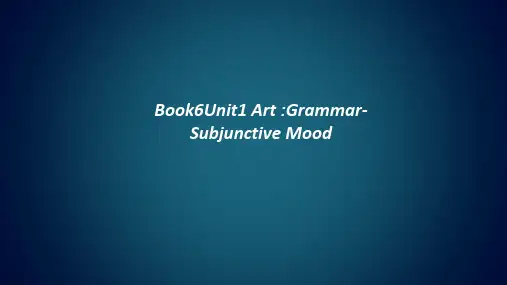
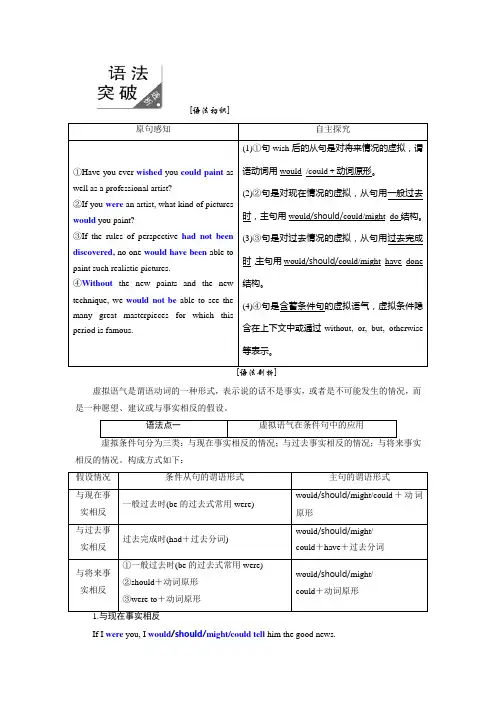
[语法初识]原句感知自主探究①Have you ever wished you could paint as well as a professional artist?②If you were an artist, what kind of pictures would you paint?③If the rules of perspective had not been discovered, no one would have been able to paint such realistic pictures.④Without the new paints and the new technique, we would not be able to see the many great masterpieces for which this period is famous.(1)①句wish后的从句是对将来情况的虚拟,谓语动词用would_/could+动词原形。
(2)②句是对现在情况的虚拟,从句用一般过去时,主句用would/should/could/might_do结构。
(3)③句是对过去情况的虚拟,从句用过去完成时,主句用would/should/could/might_have_done 结构。
(4)④句是含蓄条件句的虚拟语气,虚拟条件隐含在上下文中或通过without, or, but, otherwise 等表示。
[语法剖析]虚拟语气是谓语动词的一种形式,表示说的话不是事实,或者是不可能发生的情况,而是一种愿望、建议或与事实相反的假设。
语法点一虚拟语气在条件句中的应用相反的情况。
构成方式如下:假设情况条件从句的谓语形式主句的谓语形式与现在事实相反一般过去时(be的过去式常用were)would/should/might/could+动词原形与过去事实相反过去完成时(had+过去分词)would/should/might/could+have+过去分词与将来事实相反①一般过去时(be的过去式常用were)②should+动词原形③were to+动词原形would/should/might/could+动词原形If I were you, I would/should/might/could tell him the good news.要是我是你,我就会告诉他这个好消息。
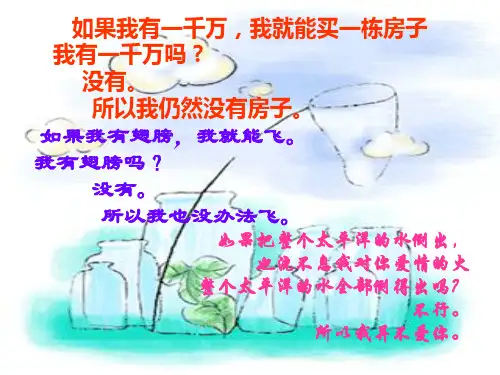

Book 6 Unit 1 Art语法虚拟语气一、相关知识点讲解1)概念虚拟语气用来表示说话人的主观愿望或假想,所说的是一个条件,不一定是事实,或与事实相反。
2)在条件句中的应用条件句可分为两类,一类为真实条件句,一类为非真实条件句。
非真实条件句表示的是假设的或实际可能性不大的情况,故采用虚拟语气。
16.1 真实条件句真实条件句用于陈述语气,假设的情况可能发生,其中if 是如果的意思。
时态关系句型:条件从句主句一般现在时shall/will + 动词原形If he comes, he will bring his violin.典型例题The volleyball match will be put off if it ___.A.will rainB. rainsC. rainedD. is rained答案B。
真实条件句主句为将来时,从句用一般现在时。
注意:1)在真实条件句中,主句不能用be going to表示将来,该用shall, will.(错) If you leave now, you are never going to regret it.(对) If you leave now, you will never regret it.2)表示真理时,主句谓语动词便不用shall (will) +动词原形,而直接用一般现在时的动词形式。
16.2 非真实条件句1)时态:可以表示过去,现在和将来的情况。
它的基本特点是时态退后。
a.同现在事实相反的假设。
句型:条件从句主句一般过去时should( would) +动词原形If they were here, they would help you.b.表示于过去事实相反的假设。
句型:条件从句主句过去完成时should(would) have+ 过去分词If she had worked harder, she would have succeeded.The rice would not have been burnt if you had been more careful.If my lawyer had been here last Saturday, he would have prevented me from going.If he had come yesterday, I should / would have told him about it.含义:He did not come yesterday, so I did not tell him about it.If he had not been ill and missed many classes, he would have made greater progress.含义:He was ill and missed many lessons, so he did not make greater progress.c.表示对将来的假想句型:条件从句主句一般过去时should+ 动词原形were+ 不定式would + 动词原形should+ 动词原形If you succeeded, everything would be all right.If you should succeed, everything would be all right.If you were to succeed, everything would be all right.16.3 混合条件句主句与从句的动作发生在不同的时间,这时主,从句谓语动词的虚拟语气形式因时间不同而不同,这叫做混合条件句。